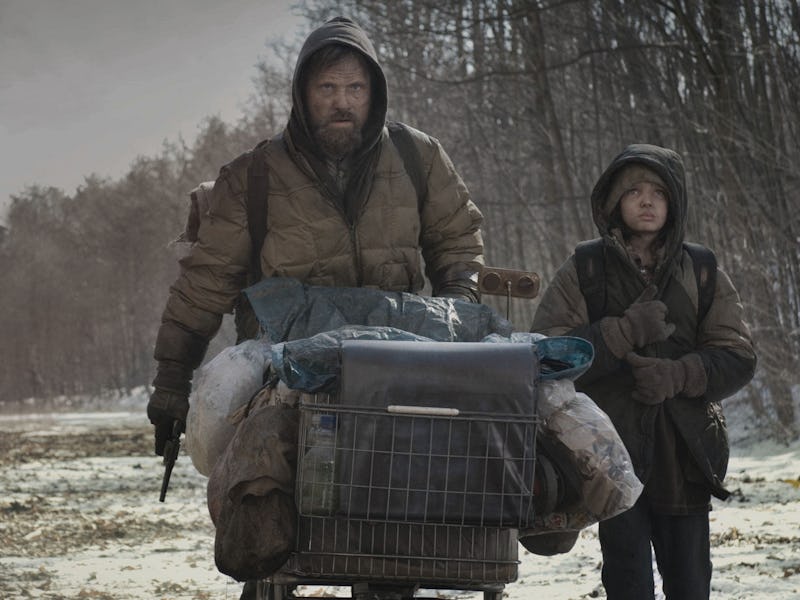The Most Influential Post-Apocalyptic Drama Remains Haunting But Hopeful
Keep the fire burning.

Stop us if you’ve heard this one before. A gruff old survivor of the apocalypse wanders desolate highways and abandoned streets, their sharp eyes trying to spot any resources or sudden threats. They are both predator and prey, but their guarded independence is compromised by a young child under their protection, someone who grew up in the aftermath of a terrible event and has lots to learn about the world’s evils. The more innocent protectee gives the older shepherd a burning sense of purpose, driving them towards a personal, spiritual cleansing even as the world around them remains sullied and scorched.
This is the story of The Road, both the 2006 Cormac McCarthy novel and John Hillcoat’s film adaptation, although the potency of its brutal meditation on surviving catastrophe lives on in the DNA of so many post-apocalyptic movies. In the film, which debuted 15 years ago, our perspective sticks unflinchingly close to a Man (Viggo Mortensen) and his Boy (Kodi Smit-McPhee) as they trudge south on a vast, empty road toward the coast. The Man’s inner thoughts tell us everything about their journey, from his backstory – his wife (Charlize Theron) ended her life to avoid a more grisly demise on the road – to how he understands his duty.
He defines himself and his son by what they aren’t — cannibals or robbers — and falls back on an inflexible but vague creed of goodness, of “carrying the fire.” This asserted refrain feels like a will or wish projected onto a cruel world, depending on God’s light without believing in divine intervention. “The boy is my warrant,” the Man confides in us. “If he is not the word of God, then God never spoke.” As he says this, we see Mortensen’s filthy face staring at us with a piercing gaze. It reminds us of something wordless missing from McCarthy’s exploration of humanity: the power of seeing real human faces amid armageddon.
The past 15 years of post-apocalyptic media have benefited from The Road’s elemental power, even if they can’t recapture it. There’s obscure indie remixes like the Martin Freeman-starring Cargo, the Australian These Final Hours, or Casey Affleck’s Light of My Life, and also mid-budget thrillers that borrow its dynamics and breathless dread like Bird Box or A Quiet Place. The films that feel most alike to Hillcoat’s minimalist, rigidly paranoid vision of an ash-coated hellscape don’t actually copy its most defining narrative choices, but It Comes at Night, The Survivalist, and The Rover have similar levels of desperation and spiritual grief etched into them.
These less revered titles all take up much less cultural space than McCarthy and Hillcoat’s text, which is not something you could say for The Last of Us, the clearest successor to the story archetype laid out in The Road. A megahit video game upon first release in 2013, there is no more ubiquitous or defining post-apocalyptic story today, with two huge games of zombie-like action and a big-budget TV series telling the story of the jaded Joel charged with guiding a potential savior, Ellie, across a fungus-infected America. Because The Road is so bare, streamlined, and narrow in focus, this and other riffs all feel like they’re building off its well-established foundation.
The Road is a tough watch, but it’s not without its moments of hope.
But while The Road’s impact is undeniable, McCarthy and Hillcoat’s vision of humans pushed to pure barbarity is imperfect. Some of the violent imagery feels tasteless; piles of tattered shoes, followed by a malnourished, sickly crowd trapped in darkness, evoke images of the Holocaust and similar atrocities, but with no interest in exploring these images further, they merely aestheticize historical horror and sever them from their actual meaning. Rather than its specific, grisly visuals being copied by post-apocalypse cinema, The Road’s mood and drive have been claimed as the genre’s core tenets.
This is not to suggest that The Road is a purely original story. Stories like Children of Men and The Walking Dead, both driven by similar quests and archetypes, predate McCarthy’s book. Outside of the post-apocalyptic genre, the dynamic of a drifter and his young charge is a common one in Westerns and samurai films dating back decades. Because nearly all Western post-apocalypse stories touch on themes of family, the passing of generations, and purpose in a horrid world, a likely origin point for The Road lies in religion — the story of Joseph shepherding Jesus and Mary to Bethlehem and then to Egypt in fear of persecution is more of a foundation for The Road and Children of Men than any contemporary text.
With this in mind, The Road doesn’t feel like the most influential post-apocalyptic drama, but the most essential, one that hones in on the genre’s emotional core and enriches it without the need for extraneous sci-fi or horror details. That’s why the film feels so definitive despite the story having clear precedents and its cultural presence being eclipsed in the 15 years since its release. The Road is what you get when you realize that the basic building blocks of apocalyptic stories are enough to devastate us.